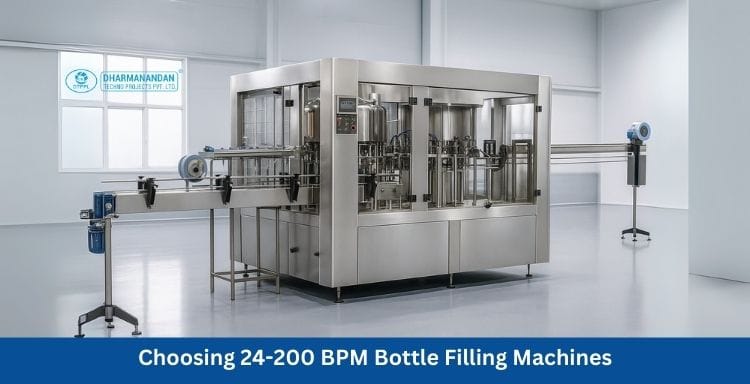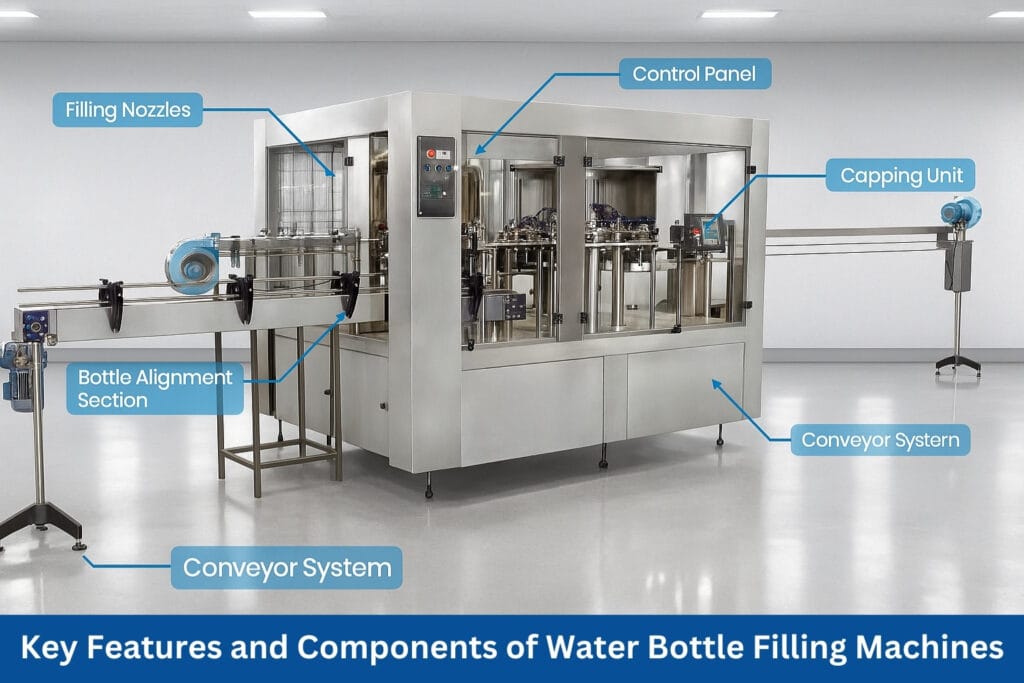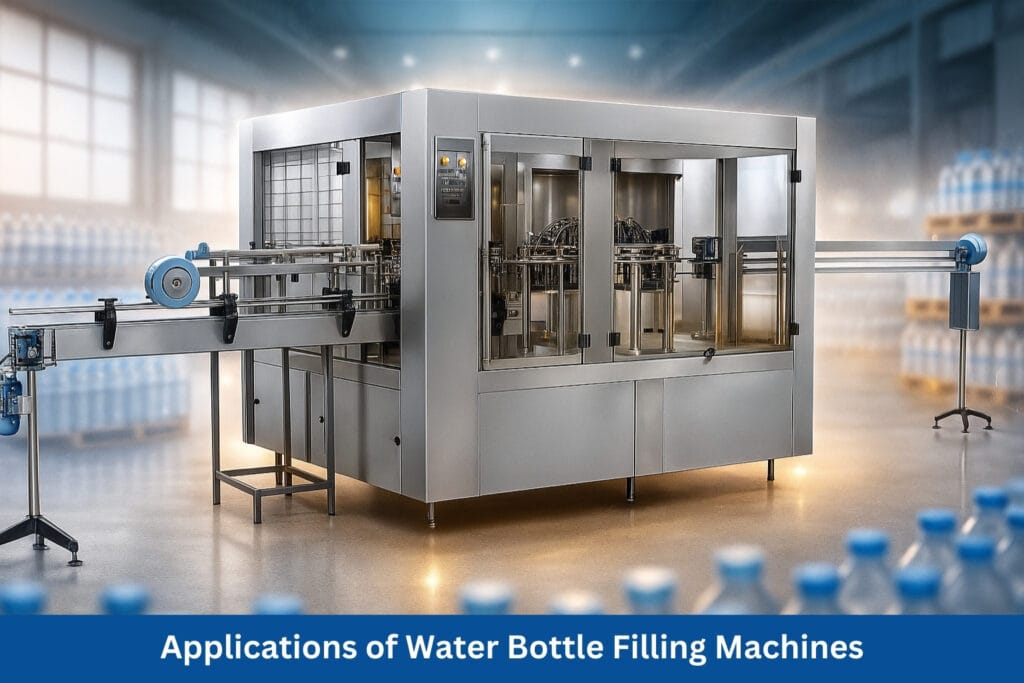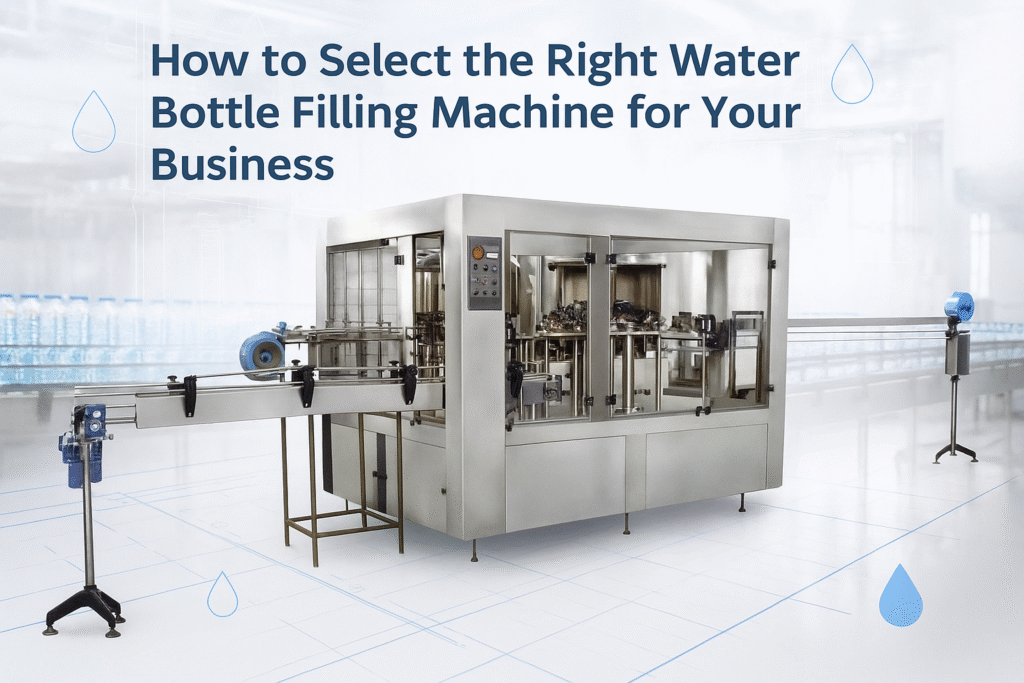
Table of Contents
24 BPM to 200 BPM Water Bottle Filling Machine Selection Based on Business Perspectives
August 29, 2025
When it comes to setting up a mineral water bottling plant, choosing the right bottle filling machine is one of the most important decisions you will make. Whether you are just starting a small-scale business or expanding your operations, understanding the key differences between various bottle filling machines can help you make an informed choice. In this article, we will explore 24 BPM to 200 BPM (Bottles per Minute) models, comparing their features, benefits, and helping you decide which machine is best for your business needs.
Types of Water Bottle Filling Machines
When considering the right machine for your bottling plant, you need to be aware of the different machine types and their applications. Here’s a breakdown of the main types of machines available:
1. Automatic 3-in-1 Rinsing, Filling, and Capping (RFC) Machine
An Automatic 3-in-1 RFC Machine integrates three essential processes-rinsing, filling, and capping-into a single unit. This high-speed system is designed for high-volume production with minimal manual labor.
- Key Features:
- Automates all three processes in a single step.
- Ideal for large-scale operations with high demand.
- Offers high-speed filling and consistent quality.
- When to Choose:
- High-demand bottling plants looking for automation.
- Businesses that require maximum efficiency and speed.
3. Semi-Automatic Filling Machine
A semi-automatic filling machine is a more cost-effective option for small-to-medium-scale operations. These machines are typically operated by a single operator who manually loads and unloads the bottles, while the machine handles the filling and capping processes automatically.
- Key Features:
- More affordable than fully automatic machines.
- Requires manual loading and unloading of bottles.
- Suitable for businesses that are growing but do not yet need high automation.
- When to Choose:
- Small bottling operations or businesses with limited budgets.
- Medium-scale businesses that require automation but still have manual processes.
3. Linear vs. Rotary Systems
Understanding the difference between linear and rotary systems is essential in selecting the right machine for your production needs.
- Linear System: In a linear system, bottles move in a straight line through the various stages of the process. This setup is ideal for smaller-scale production and slower speeds.
- Rotary System: In a rotary system, bottles are processed on a rotating turret. This design is suitable for high-speed production and large-scale operations.
- When to Choose:
- Linear systems are best for small-scale operations with lower production volumes.
- Rotary systems are suitable for businesses with large-scale production needs and require high throughput.

Key Features and Components of Water Bottle Filling Machines
No matter which machine type you choose, certain features and components are common across most models. Understanding these features will help you choose the right machine that meets your specific requirements.
1. Construction Material
Most modern water bottle filling machines are made from food-grade stainless steel (SS304 or SS316). This ensures:
- Hygiene and safety, making them suitable for food and beverage production.
- Durability to withstand long hours of production and frequent use.
2. Filling Mechanism
There are different filling mechanisms depending on the type of liquid you’re bottling and the machine’s intended use:
- Gravity Filling: Uses gravity to fill bottles to a consistent level. Ideal for thin liquids like water.
- Piston Filling: Uses a piston to measure and dispense an exact volume of water into each bottle. Suitable for thicker liquids.
3. “No Bottle, No Fill” System
This safety feature uses a photoelectric sensor to ensure that water is not dispensed if no bottle is detected. This helps to avoid wastage and improve production efficiency.
4. Cap Feeder and Capper
Automatic cap feeders and cappers ensure that caps are sorted, fed, and sealed onto the filled bottles automatically. This feature:
- Increases speed and reduces the need for manual labor.
- Helps maintain consistent quality of the finished product.
5. Control System
Many automatic machines are controlled by a Programmable Logic Controller (PLC). The PLC works with a Human-Machine Interface (HMI) touchscreen for easy operation and monitoring. This allows operators to:
- Control production settings such as filling time, temperature, and pressure.
- Monitor performance and troubleshoot easily.
6. Conveyors
- Infeed Conveyors: Move empty bottles into the filling machine.
- Outfeed Conveyors: Transport the filled bottles out for further processing or packaging.
These conveyors are designed to streamline the bottling process, reduce labor costs, and increase overall production efficiency.
7. Optional Accessories
- Water Treatment Systems: Integrates with your filling system for purification and filtering of water before bottling.
- Labeling Machines: Add labels to bottles after filling.
- Shrink Wrapping Units: Wrap finished products for distribution or storage.
These accessories can be easily added to create a complete production line.

Typical Applications of Water Bottle Filling Machines
Water bottle filling machines are widely used across several industries. Some common applications include:
- Packaged Drinking Water Plants: Producing bottled water for retail and distribution.
- Mineral Water and Purified Water Production Units: Bottling mineral water, purified water, and flavored water.
- Beverage Bottling: Filling bottles with beverages such as juices, soft drinks, and infused water.
- Pharmaceutical and Laboratory Bottling: Filling sterile bottles for pharmaceutical use or lab use.
Understanding BPM (Bottles per Minute)
Before diving into the comparison, it’s essential to understand what BPM means. BPM refers to the number of bottles filled per minute by the machine. The higher the BPM, the faster the machine, making it suitable for businesses with higher production demands. Your choice of machine will depend on factors like business size, production volume, space available, and budget.
Let’s explore each machine model in detail and see how each suits different business needs.
1. 24 BPM Mineral Water Bottle Filling Machine
The 24 BPM machine is ideal for small-scale operations and businesses that are just starting. It is suited for bottling companies with lower production requirements.
Key Features:
- Output Capacity: 24 bottles per minute
- Speed: Moderate, suitable for smaller businesses
- Machine Type: Semi-automatic or automatic models available
- Space Requirement: Compact design, fits well in smaller production spaces
- Cost: More affordable, making it a great option for startups
When to Choose:
- Low to moderate production needs
- Limited budget
- Small businesses or home-based bottling operations
- Businesses that are testing the market
Pros:
- Affordable investment for small businesses
- Low maintenance compared to high-speed machines
- Ideal for local markets or niche bottled water products
Read Our Article: What is bottle filling machines and how it works?
2. 30 BPM Mineral Water Bottle Filling Machine
The 30 BPM machine is slightly more advanced than the 24 BPM model and is perfect for businesses aiming for a slightly higher production output.
Key Features:
- Output Capacity: 30 bottles per minute
- Speed: Slightly faster than the 24 BPM model
- Machine Type: Semi-automatic or fully automatic
- Space Requirement: Compact, but may need more space than the 24 BPM machine
- Cost: Slightly more expensive than 24 BPM
When to Choose:
- Businesses with moderate production volumes
- Need for a cost-effective upgrade from a 24 BPM machine
- Small bottling plants planning to expand gradually
Pros:
- Scalable for growing businesses
- Reasonable investment for businesses with moderate output needs
- Compact design that fits into medium-sized spaces
3. 40 BPM Mineral Water Bottle Filling Machine
The 40 BPM machine is suited for businesses that require a higher output capacity but are still operating in smaller to mid-sized production environments.
Key Features:
- Output Capacity: 40 bottles per minute
- Speed: Fast enough for small to medium-scale production
- Machine Type: Fully automatic, with higher precision
- Space Requirement: Larger footprint than 30 BPM models
- Cost: Moderate to high, depending on automation level
When to Choose:
- Medium-sized businesses with growing production needs
- Companies aiming to scale up in the near future
- Bottling plants with consistent demand for water bottles
Pros:
- Suitable for medium-scale operations
- Offers a good balance between speed and cost
- High automation improves consistency and reduces labor costs
4. 60 BPM Mineral Water Bottle Filling Machine
The 60 BPM machine is a popular choice for medium-to-large businesses that need to keep up with increased demand without compromising on quality.
Key Features:
- Output Capacity: 60 bottles per minute
- Speed: Efficient for businesses with growing production needs
- Machine Type: Fully automatic, ensuring high-speed production with minimal manual labor
- Space Requirement: Larger machine size, requiring more space
- Cost: Higher investment but offers a substantial increase in output
When to Choose:
- Businesses experiencing consistent demand for bottled water
- Larger-scale production with a medium-to-high volume
- Companies that need to increase output rapidly
Pros:
- Faster production for businesses with high order volumes
- Highly automated, requiring minimal human intervention
- Ideal for medium-sized factories
5. 90 BPM Mineral Water Bottle Filling Machine
The 90 BPM machine is perfect for businesses with high-volume production needs. It is ideal for medium-to-large bottling plants and can handle high demand levels.
Key Features:
- Output Capacity: 90 bottles per minute
- Speed: High, suitable for medium to large-scale operations
- Machine Type: Fully automatic with high efficiency
- Space Requirement: Larger footprint, needs more space for installation
- Cost: Higher, suitable for businesses with established production requirements
When to Choose:
- Medium-to-large businesses with consistent and high demand
- Factories planning to scale up operations significantly
- Companies looking for an efficient and fast production system
Pros:
- High production speed increases output for large factories
- Fully automated systems ensure consistent quality
Ideal for businesses scaling up rapidly
6. 150 BPM Mineral Water Bottle Filling Machine
For businesses with very high production needs, the 150 BPM machine offers top-tier performance and speed.
Key Features:
- Output Capacity: 150 bottles per minute
- Speed: Extremely fast, designed for large-scale, high-demand environments
- Machine Type: Fully automatic, with advanced features for high efficiency
- Space Requirement: Requires a large installation area
- Cost: High investment, suitable for large-scale production
When to Choose:
- Large bottling plants with extremely high production needs
- Businesses with well-established markets and high demand
- Factories that need to operate at maximum capacity 24/7
Pros:
- Maximum output for very high-demand businesses
- High automation, reducing labor costs and human error
- Reliable and efficient, suitable for 24/7 production
7. 200 BPM Mineral Water Bottle Filling Machine
The 200 BPM machine is the highest-performing model, designed for extremely large-scale operations with massive production volumes.
Key Features:
- Output Capacity: 200 bottles per minute
- Speed: Ultra-fast, ideal for enterprises with the largest production requirements
- Machine Type: Fully automatic with cutting-edge technology for speed and precision
- Space Requirement: Requires the largest factory space
- Cost: Very high investment, typically used by the largest players in the industry
When to Choose:
- Very large bottling plants with international or national distribution
- Businesses with extremely high production targets
- Companies aiming for maximum efficiency and output
Pros:
- Highest output with incredibly fast filling rates
- Advanced technology for optimized operations
- Best for high-volume production with minimal downtime

How to Select the Right Water Bottle Filling Machine for Your Business
Choosing the right bottle filling machine depends on several factors. Here’s how you can select the machine best suited for your business:
1. Production Volume:
- If you’re just starting out or have low production needs, 24 BPM or 30 BPM machines may be sufficient.
- For medium-scale operations with increasing demand, machines with 40 BPM or 60 BPM are ideal.
- For businesses with high production requirements, a 90 BPM to 200 BPM machine will provide the speed and output necessary to meet market demands.
2. Budget Considerations:
- If your budget is tight, 24 BPM or 30 BPM machines offer a cost-effective solution. However, if you have the resources and expect high demand, investing in machines with higher BPMs will increase production capacity and overall efficiency in the long term.
3. Space Availability:
- Smaller machines like the 24 BPM or 30 BPM are more compact and suitable for facilities with limited space.
- Larger machines, such as the 150 BPM and 200 BPM models, require more factory space and are better suited for larger operations.
4. Automation:
- For businesses aiming for minimal labor and high efficiency, fully automatic models (such as 60 BPM, 90 BPM, and above) are more suitable, as they reduce manual intervention and improve consistency.
Conclusion
Selecting the right mineral water bottle filling machine is essential for the success of your bottling business. Whether you opt for a 24 BPM machine for small-scale operations or a 200 BPM machine for large-scale production, understanding your production needs, budget, and available space will guide your decision. With the right machine, you can ensure efficiency, cost-effectiveness, and quality in your bottling process.
Make sure to evaluate your business’s growth potential and select a machine that aligns with your long-term goals.
FAQs: Water Bottle Filling Machine
1. What is BPM, and why is it important when choosing a water bottle filling machine?
BPM stands for Bottles per Minute. It refers to the speed at which a bottle filling machine can fill bottles. The BPM you choose should align with your production volume. A higher BPM means a faster machine, suitable for larger production volumes, while lower BPM machines are suited for smaller-scale operations.
2. How do I know if a 24 BPM or 30 BPM machine is right for my business?
24 BPM and 30 BPM machines are ideal for businesses with low to moderate production needs. They are perfect for startups, small bottling plants, or businesses that are just starting to test the market. If you have a relatively low volume of sales or limited storage and space, these machines will work best.
3. What are the main differences between the 60 BPM and 90 BPM mineral water bottle filling machines?
The 60 BPM machine is suitable for medium-scale production needs, providing a balance between speed and cost. The 90 BPM machine, on the other hand, is better suited for businesses with high production demand. It’s faster, allowing for increased output, but requires more space and a larger investment.
4. When should I consider a 150 BPM or 200 BPM machine for my business?
If your business is rapidly growing or you have high-volume production needs, a 150 BPM or 200 BPM machine is ideal. These machines are designed for large-scale operations that require maximum output, minimal downtime, and can handle large amounts of bottled water with speed and efficiency.
5. How do I decide between semi-automatic and fully automatic filling machines?
Semi-automatic machines are generally more affordable and suitable for smaller businesses. They require more manual intervention but are ideal if your production needs are moderate. Fully automatic machines, on the other hand, require minimal human labor and are more efficient, making them ideal for businesses with high production demands.
6. How much space do I need for a 150 BPM or 200 BPM water bottle filling machine?
150 BPM and 200 BPM machines are much larger and require significantly more space than lower BPM models. You will need a larger factory floor with ample room for the machine and surrounding systems like conveyors and packaging equipment. Be sure to plan for both the machine size and any additional equipment that will accompany the system.
7. What factors should I consider when selecting a filling machine for my business?
When choosing a machine, consider the following:
- Production Volume: How many bottles do you need to fill per day?
- Space Availability: Do you have enough room for a larger machine?
- Budget: What is your investment capability?
- Growth Plans: Are you planning to expand your production in the future? If so, choose a machine that can scale with your needs.
- Automation Needs: Do you need a fully automated system, or can you manage with semi-automatic operations?
8. What are the maintenance requirements for these filling machines?
Maintenance for water bottle filling machines depends on their complexity:
- Lower BPM machines (24 BPM to 60 BPM) tend to have simpler systems and require less maintenance.
- Higher BPM machines (90 BPM and above) are more automated and may require specialized servicing for their complex components. Regular maintenance is essential to ensure smooth operation and prevent breakdowns.
9. Can I upgrade from a 24 BPM machine to a higher BPM model as my business grows?
Yes, you can often upgrade by purchasing a higher BPM machine or adding additional equipment to your current setup. Many bottling businesses start with smaller machines (24 BPM or 30 BPM) and then scale up as their production demands increase. However, transitioning to a higher BPM model may require reconfiguring your production line and upgrading infrastructure.
10. Are these machines suitable for other beverages besides water?
Yes, many of the 24 BPM to 200 BPM models can be used to fill bottles with other beverages like juices, soft drinks, and energy drinks. However, you will need to consider the specific requirements for each type of beverage, such as viscosity (for thicker liquids) or temperature control (for hot-filled products).
11. What type of bottles can these machines handle?
These machines can handle a wide range of plastic bottles, typically PET bottles. The bottle size can vary, with most machines accommodating bottles ranging from 200ml to 5L. However, ensure that the machine you select is compatible with the specific bottle sizes and shapes you plan to use.
12. How long does it take to install a water bottle filling machine?
The installation time can vary depending on the complexity of the machine. For lower BPM machines, installation can take anywhere from 1 to 3 days, while higher BPM machines may take up to 1 to 2 weeks, especially if additional equipment such as conveyors and labeling machines are also being set up.
13. What type of support is available for these machines?
Most manufacturers offer installation services, training for your team, and ongoing maintenance support. Be sure to inquire about the warranty, technical assistance, and service agreements when purchasing the machine to ensure you receive timely help in case of any issues.
14. Is it possible to purchase a used filling machine?
Yes, many companies sell used water bottle filling machines, especially as businesses upgrade their production lines. When considering a used machine, make sure to check its condition, service history, and manufacturer’s warranty. While used machines can be more affordable, they may require more maintenance and lack the latest technological advancements.
About Author

Director – Global Marketing and Sales
Mr. Bhavesh from Dharmanandan Techno Projects Pvt. Ltd. has played a pivotal role in elevating the DTPPL brand to the global stage, leveraging his exceptional expertise in marketing and communications. He is committed to helping clients achieve significant growth while strengthening their own brands. Dharmanandan Techno Projects Pvt. Ltd. is a leading manufacturer and supplier of water purification systems and turnkey solutions for mineral water plants. With years of experience in designing and delivering high-quality water treatment solutions, the company provides end-to-end services, including system design, installation, maintenance, and ongoing support. Specializing in scalable and customizable water plants, DTPPL has successfully served industries worldwide, ensuring clean and safe drinking water across diverse applications.




